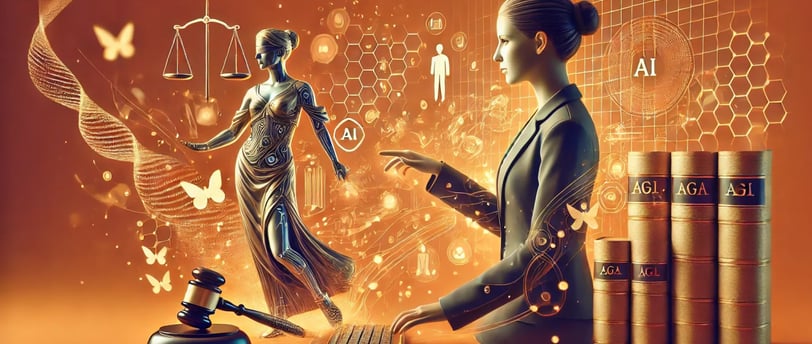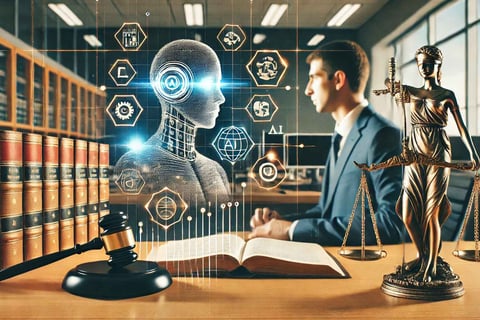How AI is Transforming the Legal Industry: From Research to Verdicts
Discover how AI is transforming the legal industry, from streamlining research to influencing verdicts. Explore the role of AI in criminal justice, its impact on fairness, and what it means for public trust.
Paola Bennardo
2/14/20255 min read


Imagine a world where legal research that once took days is completed in seconds, where predictive analytics can forecast case outcomes with surprising accuracy, and where algorithms assist judges in making fairer decisions. This isn’t science fiction—it’s the reality of how artificial intelligence (AI) is revolutionizing the legal industry. From streamlining mundane tasks to influencing high-stakes verdicts, AI is reshaping the way justice is delivered.
But with great power comes great responsibility. As AI becomes more integrated into the legal system, questions about fairness, bias, and public trust are rising to the forefront. Can AI ensure fair trials, or does it risk perpetuating algorithmic bias? In this blog post, we’ll explore how AI is transforming the legal industry, its impact on criminal justice, and what it means for the future of fairness and trust in the system.
AI in the Legal Industry: A Game-Changer
The legal industry, often seen as traditional and slow to adapt, is undergoing a seismic shift thanks to AI. Here’s how AI is making waves:
Legal Research and Document Review
Gone are the days of lawyers spending hours poring over case law and legal precedents. AI-powered tools like ROSS Intelligence and Casetext can analyze thousands of documents in seconds, identifying relevant cases and statutes with pinpoint accuracy. This not only saves time but also reduces the risk of human error.Contract Analysis and Drafting
AI tools like Kira Systems and LawGeex are transforming contract management by automating the review and drafting process. These tools can flag potential risks, ensure compliance, and even suggest edits, making contract work faster and more efficient.Predictive Analytics
AI is being used to predict case outcomes based on historical data. Tools like Lex Machina analyze past rulings to forecast how a judge might rule or how long a case might take. This helps lawyers strategize more effectively and set realistic client expectations.E-Discovery
In litigation, AI is revolutionizing e-discovery by sifting through massive amounts of electronic data to find relevant evidence. This not only speeds up the process but also reduces costs significantly.Virtual Legal Assistants
AI-powered chatbots and virtual assistants are handling routine client inquiries, scheduling appointments, and even providing basic legal advice. This frees up lawyers to focus on more complex tasks.
AI in Criminal Justice: Fair Trials or Algorithmic Bias?
While AI’s impact on the legal industry is largely positive, its role in criminal justice is more controversial. AI is being used in areas like risk assessment, sentencing, and policing, but concerns about fairness and bias are growing.
The Promise of Fairer Trials
Proponents argue that AI can reduce human bias in the legal system. For example:
Risk Assessment Tools: AI algorithms are used to assess the likelihood of a defendant reoffending. These tools are meant to provide objective data to inform bail and sentencing decisions.
Sentencing Algorithms: Some jurisdictions use AI to recommend sentences based on factors like criminal history and the severity of the crime. The goal is to ensure consistency and fairness in sentencing.
Predictive Policing: AI analyzes crime data to predict where crimes are likely to occur, helping law enforcement allocate resources more effectively.
The Risk of Algorithmic Bias
Critics, however, warn that AI can perpetuate and even amplify existing biases. Here’s why:
Biased Data: AI systems are only as good as the data they’re trained on. If historical data reflects racial or socioeconomic biases, the AI will replicate those biases. For example, a risk assessment tool might unfairly flag minority defendants as high-risk because of biased policing practices in the past.
Lack of Transparency: Many AI algorithms are “black boxes,” meaning their decision-making processes are not easily understood. This lack of transparency makes it difficult to challenge unfair outcomes.
Over-Reliance on AI: Judges and lawyers might rely too heavily on AI recommendations, potentially overlooking unique circumstances that require human judgment.
Impact on Public Trust
The use of AI in criminal justice has significant implications for public trust. If people believe the system is biased or unfair, they may lose faith in the legal system altogether. High-profile cases of algorithmic bias have already sparked outrage, highlighting the need for careful regulation and oversight.
FAQs About AI in the Legal Industry
Q: Can AI replace lawyers?
A: While AI can handle many tasks traditionally done by lawyers, it’s unlikely to replace them entirely. AI excels at data analysis and routine tasks, but it lacks the creativity, empathy, and strategic thinking that human lawyers bring to the table.
Q: How accurate are AI predictions in legal cases?
A: AI predictions are based on historical data and patterns, so their accuracy depends on the quality and relevance of that data. While they can provide valuable insights, they’re not foolproof and should be used as a tool rather than a definitive guide.
Q: What are the ethical concerns surrounding AI in criminal justice?
A: The main concerns are bias, transparency, and accountability. If AI systems are biased or opaque, they can lead to unfair outcomes. There’s also the question of who is responsible when an AI makes a mistake—the developer, the user, or the AI itself?
Q: How can we ensure AI is used ethically in the legal industry?
A: Ethical AI use requires robust regulation, transparency, and ongoing oversight. Developers must ensure their algorithms are free from bias, and users must be trained to understand the limitations of AI.
The Future of AI in the Legal Industry
The integration of AI into the legal industry is still in its early stages, but its potential is immense. Here’s what the future might hold:
Enhanced Access to Justice
AI can make legal services more affordable and accessible, helping bridge the justice gap for underserved communities. For example, AI-powered chatbots can provide free legal advice, and online platforms can connect clients with affordable lawyers.Smarter Courts
Courts are beginning to adopt AI to streamline processes like case management and document filing. In the future, we might see fully automated “smart courts” that use AI to handle routine cases, freeing up judges to focus on more complex matters.Global Legal Standards
As AI becomes more widespread, there will be a growing need for global standards to ensure consistency and fairness. International organizations may play a key role in developing these standards.Continuous Learning and Adaptation
AI systems will continue to evolve, becoming more accurate and less biased over time. This will require ongoing collaboration between technologists, legal experts, and policymakers.
Conclusion
AI is transforming the legal industry in ways that were unimaginable just a decade ago. From speeding up legal research to influencing criminal justice outcomes, AI is proving to be a powerful tool. However, its use also raises important questions about fairness, bias, and public trust.
As we move forward, it’s crucial to strike a balance between innovation and ethics. By addressing the challenges of algorithmic bias and ensuring transparency, we can harness the power of AI to create a legal system that is not only more efficient but also more just.
The future of the legal industry is here, and it’s powered by AI. The question is: Are we ready to embrace it responsibly?


AI ZENTRO
Stay updated with the latest AI innovations today.
AI ZENTRO © 2025. All rights reserved.
